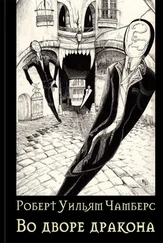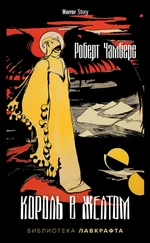Роберт Чамберс - In Search of the Unknown
Здесь есть возможность читать онлайн «Роберт Чамберс - In Search of the Unknown» весь текст электронной книги совершенно бесплатно (целиком полную версию без сокращений). В некоторых случаях можно слушать аудио, скачать через торрент в формате fb2 и присутствует краткое содержание. Год выпуска: 2014, Издательство: epubBooks Classics, Жанр: Фантастика и фэнтези, на английском языке. Описание произведения, (предисловие) а так же отзывы посетителей доступны на портале библиотеки ЛибКат.
- Название:In Search of the Unknown
- Автор:
- Издательство:epubBooks Classics
- Жанр:
- Год:2014
- ISBN:нет данных
- Рейтинг книги:3 / 5. Голосов: 1
-
Избранное:Добавить в избранное
- Отзывы:
-
Ваша оценка:
- 60
- 1
- 2
- 3
- 4
- 5
In Search of the Unknown: краткое содержание, описание и аннотация
Предлагаем к чтению аннотацию, описание, краткое содержание или предисловие (зависит от того, что написал сам автор книги «In Search of the Unknown»). Если вы не нашли необходимую информацию о книге — напишите в комментариях, мы постараемся отыскать её.
In Search of the Unknown — читать онлайн бесплатно полную книгу (весь текст) целиком
Ниже представлен текст книги, разбитый по страницам. Система сохранения места последней прочитанной страницы, позволяет с удобством читать онлайн бесплатно книгу «In Search of the Unknown», без необходимости каждый раз заново искать на чём Вы остановились. Поставьте закладку, и сможете в любой момент перейти на страницу, на которой закончили чтение.
Интервал:
Закладка:
I spent an hour or two in the smoking compartment, tenanted only by a single passenger and myself. He was an agreeable young man, although, in the natural acquaintanceship that we struck up, I regretted to learn that he was a writer of popular fiction, returning from Fort Worth, where he had been for the sole purpose of composing a poem on Florida.
I have always, in common with other mentally balanced savants, despised writers of fiction. All scientists harbor a natural antipathy to romance in any form, and that antipathy becomes a deep horror if fiction dares to deal flippantly with the exact sciences, or if some degraded intellect assumes the warrantless liberty of using natural history as the vehicle for silly tales.
Never but once had I been tempted to romance in any form; never but once had sentiment interfered with a passionless transfer of scientific notes to the sanctuary of the unvarnished note–book or the cloister of the juiceless monograph. Nor have I the slightest approach to that superficial and doubtful quality known as literary skill. Once, however, as I sat alone in the middle of the floor, classifying my isopods, I was not only astonished but totally unprepared to find myself repeating aloud a verse that I myself had unconsciously fashioned:
"An isopod
Is a work of God."
Never before in all my life had I made a rhyme; and it worried me for weeks, ringing in my brain day and night, confusing me, interfering with my thoughts.
I said as much to the young man, who only laughed good–naturedly and replied that it was the Creator's purpose to limit certain intellects, nobody knows why, and that it was apparent that mine had not escaped.
"There's one thing, however," he said, "that might be of some interest to you and come within the circumscribed scope of your intelligence."
"And what is that?" I asked, tartly.
"A scientific experience of mine," he said, with a careless laugh. "It's so much stranger than fiction that even Professor Bruce Stoddard, of Columbia, hesitated to credit it."
I looked at the young fellow suspiciously. His bland smile disarmed me, but I did not invite him to relate his experience, although he apparently needed only that encouragement to begin.
"Now, if I could tell it exactly as it occurred," he observed, "and a stenographer could take it down, word for word, exactly as I relate it—"
"It would give me great pleasure to do so," said a quiet voice at the door. We rose at once, removing the cigars from our lips; but Miss Barrison bade us continue smoking, and at a gesture from her we resumed our seats after she had installed herself by the window.
"Really," she said, looking coldly at me, "I couldn't endure the solitude any longer. Isn't there anything to do on this tiresome train?"
"If you had your pad and pencil," I began, maliciously, "you might take down a matter of interest—"
She looked frankly at the young man, who laughed in that pleasant, good–tempered manner of his, and offered to tell us of his alleged scientific experience if we thought it might amuse us sufficiently to vary the dull monotony of the journey north.
"Is it fiction?" I asked, point–blank.
"It is absolute truth," he replied.
I rose and went off to find pad and pencil. When I returned Miss Barrison was laughing at a story which the young man had just finished.
"But," he ended, gravely, "I have practically decided to renounce fiction as a means of livelihood and confine myself to simple, uninteresting statistics and facts."
"I am very glad to hear you say that," I exclaimed, warmly. He bowed, looked at Miss Barrison, and asked her when he might begin his story.
"Whenever you are ready," replied Miss Barrison, smiling in a manner which I had not observed since the disappearance of Professor Farrago. I'll admit that the young fellow was superficially attractive.
"Well, then," he began, modestly, "having no technical ability concerning the affair in question, and having no knowledge of either comparative anatomy or zoology, I am perhaps unfitted to tell this story. But the story is true; the episode occurred under my own eyes—within a few hours' sail of the Battery. And as I was one of the first persons to verify what has long been a theory among scientists, and, moreover, as the result of Professor Holroyd's discovery is to be placed on exhibition in Madison Square Garden on the 20th of next month, I have decided to tell you, as simply as I am able, exactly what occurred.
"I first told the story on April 1, 1903, to the editors of the North American Review , The Popular Science Monthly , the Scientific American , Nature , Outing , and the Fossiliferous Magazine . All these gentlemen rejected it; some curtly informing me that fiction had no place in their columns. When I attempted to explain that it was not fiction, the editors of these periodicals either maintained a contemptuous silence, or bluntly notified me that my literary services and opinions were not desired. But finally, when several publishers offered to take the story as fiction, I cut short all negotiations and decided to publish it myself. Where I am known at all, it is my misfortune to be known as a writer of fiction. This makes it impossible for me to receive a hearing from a scientific audience. I regret it bitterly, because now, when it is too late, I am prepared to prove certain scientific matters of interest, and to produce the proofs. In this case, however, I am fortunate, for nobody can dispute the existence of a thing when the bodily proof is exhibited as evidence.
"This is the story; and if I tell it as I write fiction, it is because I do not know how to tell it otherwise.
"I was walking along the beach below Pine Inlet, on the south shore of Long Island. The railroad and telegraph station is at West Oyster Bay. Everybody who has travelled on the Long Island Railroad knows the station, but few, perhaps, know Pine Inlet. Duck–shooters, of course, are familiar with it; but as there are no hotels there, and nothing to see except salt meadow, salt creek, and a strip of dune and sand, the summer–squatting public may probably be unaware of its existence. The local name for the place is Pine Inlet; the maps give its name as Sand Point, I believe, but anybody at West Oyster Bay can direct you to it. Captain McPeek, who keeps the West Oyster Bay House, drives duck–shooters there in winter. It lies five miles southeast from West Oyster Bay.
"I had walked over that afternoon from Captain McPeek's. There was a reason for my going to Pine Inlet—it embarrasses me to explain it, but the truth is I meditated writing an ode to the ocean. It was out of the question to write it in West Oyster Bay, with the whistle of locomotives in my ears. I knew that Pine Inlet was one of the loneliest places on the Atlantic coast; it is out of sight of everything except leagues of gray ocean. Rarely one might make out fishing–smacks drifting across the horizon. Summer squatters never visited it; sportsmen shunned it, except in winter. Therefore, as I was about to do a bit of poetry, I thought that Pine Inlet was the spot for the deed. So I went there.
"As I was strolling along the beach, biting my pencil reflectively, tremendously impressed by the solitude and the solemn thunder of the surf, a thought occurred to me—how unpleasant it would be if I suddenly stumbled on a summer boarder. As this joyless impossibility flitted across my mind, I rounded a bleak sand–dune.
"A girl stood directly in my path.
"She stared at me as though I had just crawled up out of the sea to bite her. I don't know what my own expression resembled, but I have been given to understand it was idiotic.
"Now I perceived, after a few moments, that the young lady was frightened, and I knew I ought to say something civil. So I said, 'Are there many mosquitoes here?'
Читать дальшеИнтервал:
Закладка:
Похожие книги на «In Search of the Unknown»
Представляем Вашему вниманию похожие книги на «In Search of the Unknown» списком для выбора. Мы отобрали схожую по названию и смыслу литературу в надежде предоставить читателям больше вариантов отыскать новые, интересные, ещё непрочитанные произведения.
Обсуждение, отзывы о книге «In Search of the Unknown» и просто собственные мнения читателей. Оставьте ваши комментарии, напишите, что Вы думаете о произведении, его смысле или главных героях. Укажите что конкретно понравилось, а что нет, и почему Вы так считаете.












